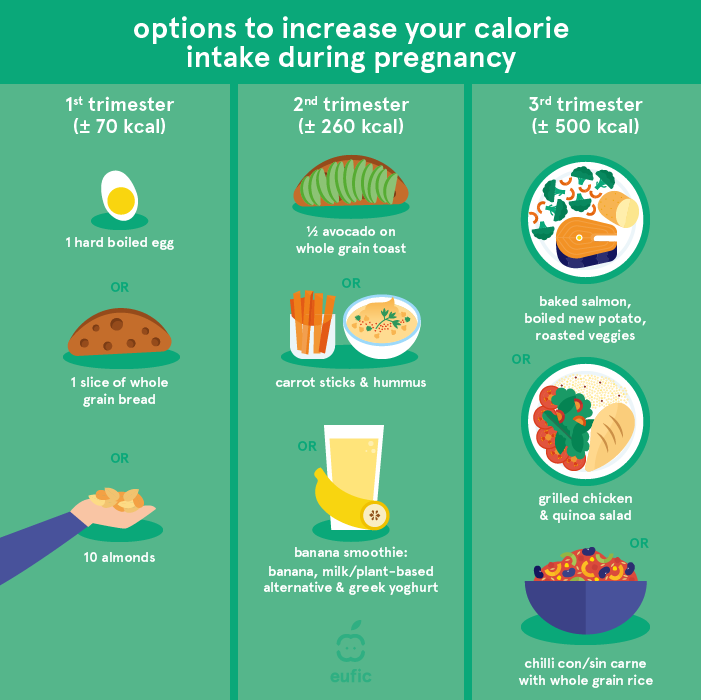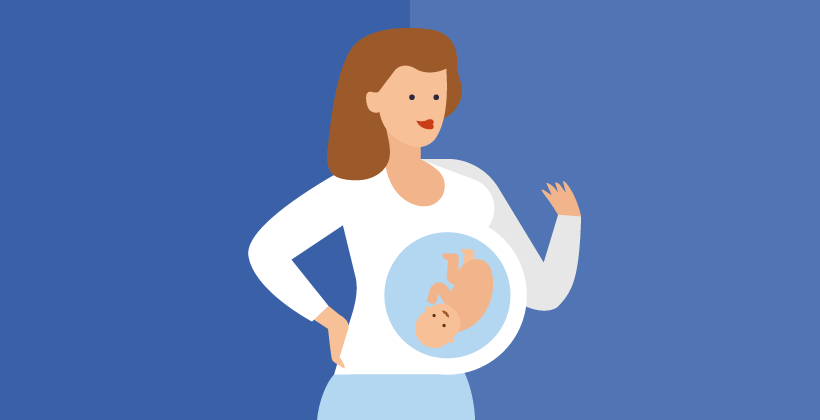Healthy weight gain during pregnancy
Last Updated : 01 August 2021It is normal and recommended for people with healthy weight to gain some weight during pregnancy. Increased body weight comes from the growth of your baby, uterus and placenta, in addition to an increase in body fat and amniotic fluid.1 However, it is a common misconception that “eating for two” is necessary to meet the extra energy needs. A person with healthy weight before pregnancy does need to increase the calorie intake during pregnancy, but energy balance is just as important during pregnancy as it is normally.
How many extra calories do I need while pregnant?
A person with a healthy weight (BMI 18.5 - 24.9)2 and moderately active lifestyle needs on average 2,000 calories a day. During pregnancy, the European Food Safety Authority (EFSA) recommends increasing total calorie intake by an additional 70 kcal/day in the first trimester, by 260 kcal/day in the second trimester and by 500 kcal/day in the third trimester,3 although advice from other European health organisations may differ slightly. Recommended pregnancy weight gain also depends on your weight before pregnancy.

Figure 1. Some examples of snacks/meals that can help you reach the recommended calorie intake per trimester of pregnancy.
How much weight should I gain during pregnancy?
The recommended amount of pregnancy weight gain varies for everyone and strongly depends on pre-pregnancy weight and body mass index (BMI). For example, pregnant women with overweight or obesity are generally recommended to gain less weight than women with underweight. The recommended weight gain usually varies between 5 and 18 kg.4
You will gain most of the weight in the second half of your pregnancy. Gaining much more weight than the recommended amount can increase the risk of complications during pregnancy and delivery as well as increase the baby’s risk of high birth weight.4,5 Being underweight or putting on too little weight during pregnancy may also increase some health risks in pregnancy, such as miscarriage, premature (preterm) birth or delivering a baby with low birth weight.6,7
Eating a healthy and balanced diet throughout the pregnancy will help you reach the weight recommendations and reduce the associated risks. A doctor or midwife would be able to guide and help you through a healthy pregnancy.
Can I lose weight during pregnancy?
During pregnancy, it is important to meet your nutritional needs to support the growth and development of your baby. Therefore, dieting and losing weight during pregnancy is not recommended, even if you are overweight.8 Instead, try to focus on eating a healthy diet and regular physical activity to keep yourself and your baby healthy.
Can I exercise while pregnant?
Being active during pregnancy is safe and has both physical and psychological benefits.9 Moderate-intensity activity for 150 minutes per week, preferably spread throughout the week, is recommended in many countries. Both aerobic and muscle strengthening activities such as walking, cycling, swimming, stationary cycling, prenatal yoga moderate resistance and weight training are great, safe options during pregnancy.10
Physical activity and exercise can support a healthy weight gain during pregnancy. Regular exercise also strengthens muscles and improves overall fitness, helping your body to prepare for labour and delivery, and has been linked to improved emotional well-being during pregnancy.9,10
Swimming can be a good and comfortable type of exercise as the water helps support the increased weight. Sports with risks of falling, such as horse riding, downhill skiing and cycling should be done with caution. It is also important to always listen to your body and not exhaust or overheat yourself.
Eat healthy and keep active for healthy pregnancy weight gain
During pregnancy, it is important to maintain a healthy and balanced diet. Choose nutrient-rich foods to add the right amount of extra calories to your diet. Staying physically active will also help you to gain the right amount of weight.
Seek help from your doctor or midwife if you are unsure about how much weight you should gain. If you start your pregnancy while being underweight or overweight, your doctor or midwife can also help you to guide you through your pregnancy. Do make sure to go to all prenatal appointments so your healthcare provider can keep track of your pregnancy. If you were not active before pregnancy or if you are unsure if a particular type of activity is safe, they can advise you about what type of exercise is right for you.
References
- Most J, et al. (2019) Energy intake requirements in pregnancy. Nutrients 11(8):1812.
- World Health Organization. Body Mass Index.
- European Food Safety Authority (2013) Scientific Opinion on Dietary Reference Values for energy. EFSA Journal 11:3005.
- Rasmussen KM, Yaktine AL, Institute of Medicine (2009) and National Research Council (US) Committee to Reexamine IOM Pregnancy Weight Guidelines, eds. Weight Gain During Pregnancy: Reexamining the Guidelines. Washington (DC): National Academies Press (US).
- Ludwig, DS & Currie J (2010) The association between pregnancy weight gain and birthweight: A within-family comparison. Lancet 18;376(9745):984-90.
- Siega-Riz AM et al. (2009) A systematic review of outcomes of maternal weight gain according to the Institute of Medicine recommendations: birthweight, fetal growth, and postpartum weight retention. American Journal of Obstetrics and Gynecology 201(4):3
- Balsells M, García-Patterson A & Corcoy R (2016) Systematic review and meta-analysis on the association of prepregnancy underweight and miscarriage. European Journal of Obstetrics and Gynecology and Reproductive Biology 207:73-79.
- Helsenorge. Dietary advice for Pregnant Women.
- Prather H, Spitznagle T & Hunt D (2012) Benefits of exercise during pregnancy. Physical Medicine and Rehabilitation 4(11):845–850
- Artal R. & O’Toole M (2003) Guidelines of the American College of Obstetricians and Gynecologists for exercise during pregnancy and the postpartum period. British Journal of Sports Medicine 37:6-12.



